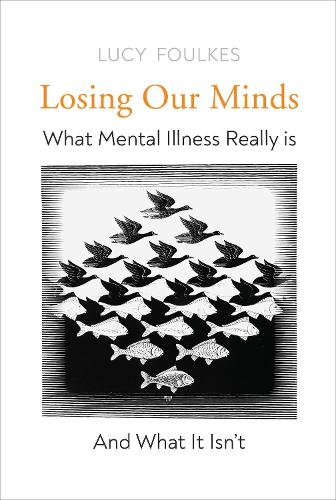
Losing Our Minds: What Mental Illness Really Is and What It Isnt
(Paperback)
Publishing Details
Losing Our Minds: What Mental Illness Really Is and What It Isnt
By (Author) Lucy Foulkes
Vintage Publishing
The Bodley Head Ltd
1st April 2021
United Kingdom
Classifications
Tertiary Education
Non Fiction
616.89
Physical Properties
Paperback
240
Width 154mm, Height 234mm, Spine 18mm
298g
Description
A vital corrective and accessible guide to the science of mental illness We need to rethink the conversation around mental health. Public awareness of mental illness has been transformed in recent years, but our understanding of what it actually is has yet to catch up. Too often, psychiatric disorders are confused with the inherent stresses and challenges of human experience. A narrative has taken hold that a mental health crisis has been building among young people in recent years - one that, with the arrival of Covid-19, is set to get far worse. In this profoundly sensitive and constructive book, psychologist Lucy Foulkes argues that the crisis is one of ignorance as much as illness. Have we raised a 'snowflake' generation Or are today's young people subjected to greater stress, exacerbated by social media, than ever before Foulkes shows that both perspectives are useful but limited. As the effects of the pandemic take hold, the real question in need of answering is- how should we distinguish between 'normal' suffering and actual illness Drawing on her extensive knowledge of the scientific and clinical literature, Foulkes explains what is known about mental health problems - how they arise, why they so often appear during adolescence, the various tools we have to cope with them - but also what remains unclear- distinguishing between normality and disorder is essential if we are to provide the appropriate help, but no clear line between the two exists in nature. She presents the argument that the widespread misunderstanding of this aspect of mental illness might actually be contributing to its apparent prevalence. Losing Our Minds provides both the clarity and the nuance that are so urgently needed.
Reviews
This beautifully written and compassionate account, backed by state-of-the-art scientific evidence, delivers an important message: there is far more variation in the state of our mental health and far more complexity in the diagnosis of mental illness than we tend to believe. This book is needed urgently so that we can examine fears of a tsunami of mental health problems, especially in the light of the current pandemic. Anyone touched by such problems will find much helpful practical advice -- Uta Frith, Professor Emeritus of Cognitive Development
This wonderful book offers an amazingly readable and cutting-edge scientific account of mental illness and its relation to the stresses many young adults experience as well as the language we use to talk about ourselves -- Matthew Broome, Professor of Psychiatry and Youth Mental Health
Losing Our Minds communicates complex research findings on mental illness with unusual clarity and compassion, and without oversimplifying or shying away from the difficult questions. Everyone who either lives with or knows someone with mental illness should read it. In other words, everyone should read it -- Essi Viding, Professor of Developmental Psychopathology
A broad and refreshingly non-political survey ... [that] highlight[s] several difficult truths about the reality of mental illness ... Foulkes carefully lays out what we know ... Some of her findings are surprising ... Foulkes is not interested in grand generational diagnoses. She argues that while everyone may suffer from the symptoms of mental distress, only a minority experience mental illness ... Foulkes's message is a cry for nuance and complexity. As she writes, 'all forms of psychological distress are the price we pay for being alive.' While those who are seriously unwell have a right to professional attention, for the rest of us, an awareness of this truth may be just the treatment we need -- Nicholas Harris * Prospect *
A totally counter culture take ... kind and clear-thinking -- Helen Rumbelow
Author Bio
Dr Lucy Foulkes is a psychologist who researches mental health and social development in adolescence. She is an honorary lecturer in psychology at UCL and lives in London. Losing Our Minds is her first book.
